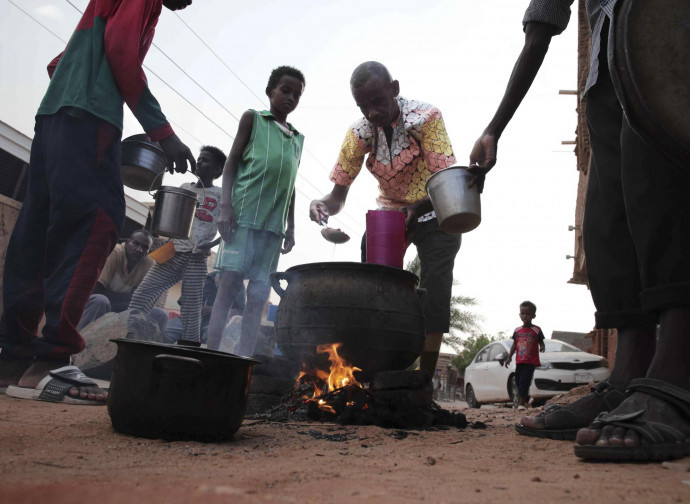Civil war in Sudan causes the world's largest humanitarian crisis
The conflict, which has been going on since 2023, has caused the world's worst food and health crisis. In the face of international efforts to help the Sudanese people, other countries are stirring the pot by siding with the two warring generals.

No country in the world has more hungry people than Sudan. The war between two rival generals - Abdel Fattah al-Burhan and Mohamed Hamdan Dagalo - has created the world's worst food crisis in decades. Out of a population of around 50 million, almost 26 million are now suffering from severe food shortages and are in urgent need of vital assistance.
The worst off are those forced to flee the fighting, more than 11 million people who have lost everything. But starvation also often affects those who have stayed behind, risking their lives if they venture out of their homes because the shooting continues in the streets and they are unable to look after their crops and livestock, as well as those who live in towns that have been under siege for a long time and where nothing is coming in. First, food prices skyrocket. Then there is nothing left and people are reduced to eating leaves, grass and even the earth.
Add to this an unprecedented health emergency. One by one, dozens of hospitals and hundreds of clinics have ceased to function: without staff, because almost everyone has fled or is unable to come to work because of the fighting; without electricity for hours or days at a time; without machines to replace those that have broken down or been damaged by bombing; without supplies of medicines, because stocks are running out. In the capital, Khartoum, in the only surviving maternity ward, doctors have sometimes been forced to perform caesarean sections by the light of their colleagues' mobile phones. People are dying of curable diseases and worsening conditions that require treatment that is being withheld.
General Abdel Fattah al-Burhan, head of the armed forces and the military junta that seized power in a coup in 2021, has more than 120,000 government troops at his disposal. General Mohamed Hamdan Dagalo, who was his deputy until April 2023, commands the Rapid Support Forces (RSF), a paramilitary force of around 100,000. Both let their men wreak havoc on civilians. Their armies have been accused of war crimes for the way they harass the population and for using starvation as a weapon of war, preventing international aid from reaching the needy in areas controlled by their opponents. The RSF have also been accused of crimes against humanity and ethnic cleansing in Darfur, a region where in the past, since 2003, they have massacred the sedentary African ethnic groups to make way for those of Arab origin dedicated to pastoralism. That was the implementation of the Arabisation plan desired by the then President Omar al Bashir (against whom the International Criminal Court issued an international arrest warrant for war crimes and crimes against humanity in 2009 and then again in 2010, which was never executed).
There are so-called 'forgotten' wars. The media and the international community are accused of not caring enough about them. This is not the case with the war in Sudan. In all the months since the conflict began, the international effort to help the population has been generous, constant and courageous. But it is not a 'forgotten war' in another sense. In fact, the intervention of third countries is helping it to continue. Dagalo receives military and financial aid mainly from the United Arab Emirates and Russia. Al-Burhan receives it mainly from Egypt, Iran and, apparently, Ukraine.
International calls for a ceasefire and a truce have so far been unsuccessful. Al-Burhan and Dagalo repeat that they intend to fight until the enemy is totally defeated. But on 18 November, Britain and Sierra Leone made a new attempt. They submitted a draft resolution to the UN Security Council calling for an immediate cessation of hostilities and the start of talks to reach a ceasefire. 14 of the 15 Council members voted in favour of the draft. However, Russia vetoed the resolution and it was not adopted.
The reason, according to Russia's UN representative, Dmitry Polyanskiy, was that it ignored Sudanese sovereignty, and that Britain's was just 'an attempt to interfere in Sudan's affairs'. Then on X he wrote: 'Britain, shame on you! For attempting to pass a resolution that will add fuel to the fire of the Sudanese crisis and allow Western countries to benefit from the murky waters they love so much in their former colonies'.
'I ask the Russian representative, who i sitting there on the phone', replied British Foreign Secretary David Lammy, 'in all conscience how many more Sudanese have to be killed? How many more women have to be raped? How many more children have to go without food?
Someone, every day, would be the answer, and every day someone more, because the people of Sudan are exhausted, and not just by the 19 months of the current conflict. Since independence in 1956, Sudan has been at war for 54 out of 68 years. For 30 years, the Sudanese have suffered under a brutal and ruthless dictatorship under the rule of al-Bashir. They have also experienced and participated in 35 coups, coup attempts and coup plots, more than any other country in Africa. The threat of famine has always loomed over them. In 2022, before the war began, more than 30% of the population suffered from chronic malnutrition. The war has only exacerbated a food crisis rooted in decades of economic mismanagement and devastating wars.
A few days ago, Jan Egeland, director of the Norwegian Refugee Council, said that Sudan risks becoming another 'failed state' as civil society disintegrates into a proliferation of armed groups. In fact, it already is and always has been.
